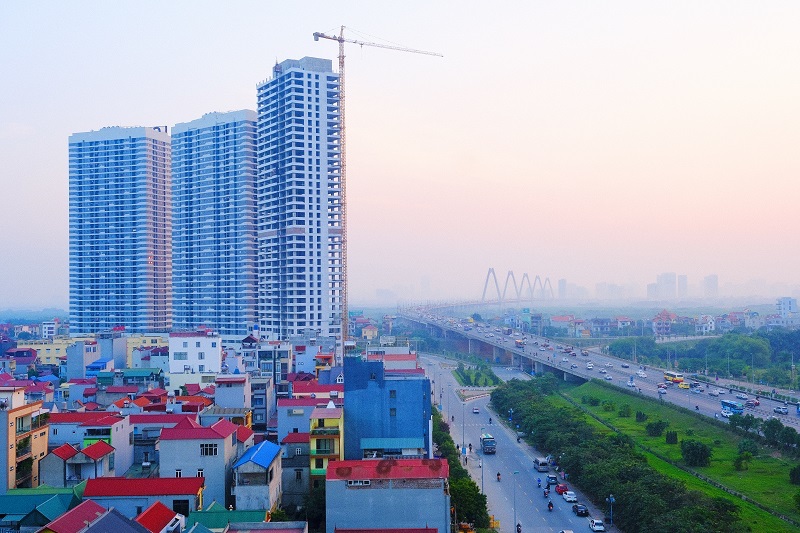Hanoi properties in suburban areas to notably grow this year
Suburban real estate segment has become the choice of many investors over the past time.
Real estate in Hanoi suburban areas is setting a new price level, which is forecast to rise further this year, local experts have said.
| Dong Anh District's property project. Photo: Pham Hung/ The Hanoi Times |
The mega projects or satellite towns with an area of several hundred hectares each on the outskirts of the city are becoming the major supply sources in the real estate market.
High demand, high prices
From the beginning of the year, local developers continued to invest in a series of mega projects in the city’s suburban areas such as Me Linh Central, Happy Land (Dong Anh District), and Tecco Garden (Thanh Tri District). As a result, prices have increased by 10-20% on average.
Current property prices in some areas within 100km from Hanoi's downtown such as Luong Son, Kim Boi and Da Bac districts (the northern province of Hoa Binh), have tripled compared to the end of 2021. The list price has seen a sharp increase in neighborhoods within 50km from Hanoi such as Bac Ninh (61%), and Hung Yen (22%).
According to the first-quarter report by the property website batdongsan.com.vn, more homes in the suburban districts of Hanoi are listed such as Chuong My (74%), Quoc Oai (26%), Gia Lam (21%), Dong Anh (20%), and Thach That (11%).
More than two years of the Covid-19 pandemic have changed the life of residents, especially those living in high-rise apartment buildings in inner areas. Living space has become important to them after they experienced a long time being confined in flats. They are now looking for properties away from downtown to enjoy healthy living.
Hoang Bich Lan, a resident of the Thanh Xuan District’s project, Hanoi, shared that when the social distance was over, she bought another house in Luong Son district, Hoa Binh Province.
"It's not just a concern about diseases, but also about health issues related to dust, noise pollution when we live in the central area," she said. "Therefore, we need to look for a new home that can meet two criteria, including return on investment and our family's health care."
According to Kantar, the market research company, unpredictable developments of the Covid-19 pandemic and social distancing periods have had a strong impact on the lifestyle, the needs and behaviors of Vietnamese people. They are more aware and interested in health risk prevention, as well as ready to give priority to products that ensure health and the environment.
Mauro Gasparotti, Director of Savills Hotels Asia-Pacific said: “It is no coincidence that suburban real estate segment has become the choice of many investors over the past time, as the projects are not too far from the center.”
The inter-regional traffic system in large urban areas such as Hanoi and Ho Chi Minh City is progressively completed, well planned and legally transparent, he added.
Echoing Mauro Gasparotti, Vice Chairman of Vietnam Real Estate Association Nguyen Van Dinh said the business strategy of investors is to move their investments to the suburban areas in the context that land fund in the center is increasingly scarce.
Therefore, the expert said, in the long term, suburban real estate still has more potential because the people's need to hoard assets is still large. Construction of infrastructure projects is underway and will promote the development of these suburban areas.
Recommendations
The National Assembly is considering five large-scale transport infrastructure projects, including three highway projects, two ring road projects in the capital and the next phase of the Ho Chi Minh Highway project which would further increase the attractiveness of the neighboring markets in the country's two biggest cities.
In the past, suburban areas were perceived as the edge of the city, but now that road infrastructure has been developed, commuting has become convenient, leading to a change in the concept of suburbs.
"Areas and places with a distance of about 2-3 hours from the center are also called suburbs," MIK Group General Director Nguyen Thi Hong Hue acknowledged.
Dividing the real estate into three types: those in the central area, those in the buffer zone and the suburban area, Hai Phat Invest Director of Sales Do Quy Duy suggested to local investors that development in the suburban areas is often slower than in the central area, so investing in the segment needs a long-term vision to have a reasonable financial structure.
According to a recent report by CBRE Vietnam, as of 2021, the real estate market witnessed a strong movement of cash flow from other markets as 16% of investors said they will invest more in the field of sanitary real estate segment in large suburban areas, even in the post-Covid-19 period.












